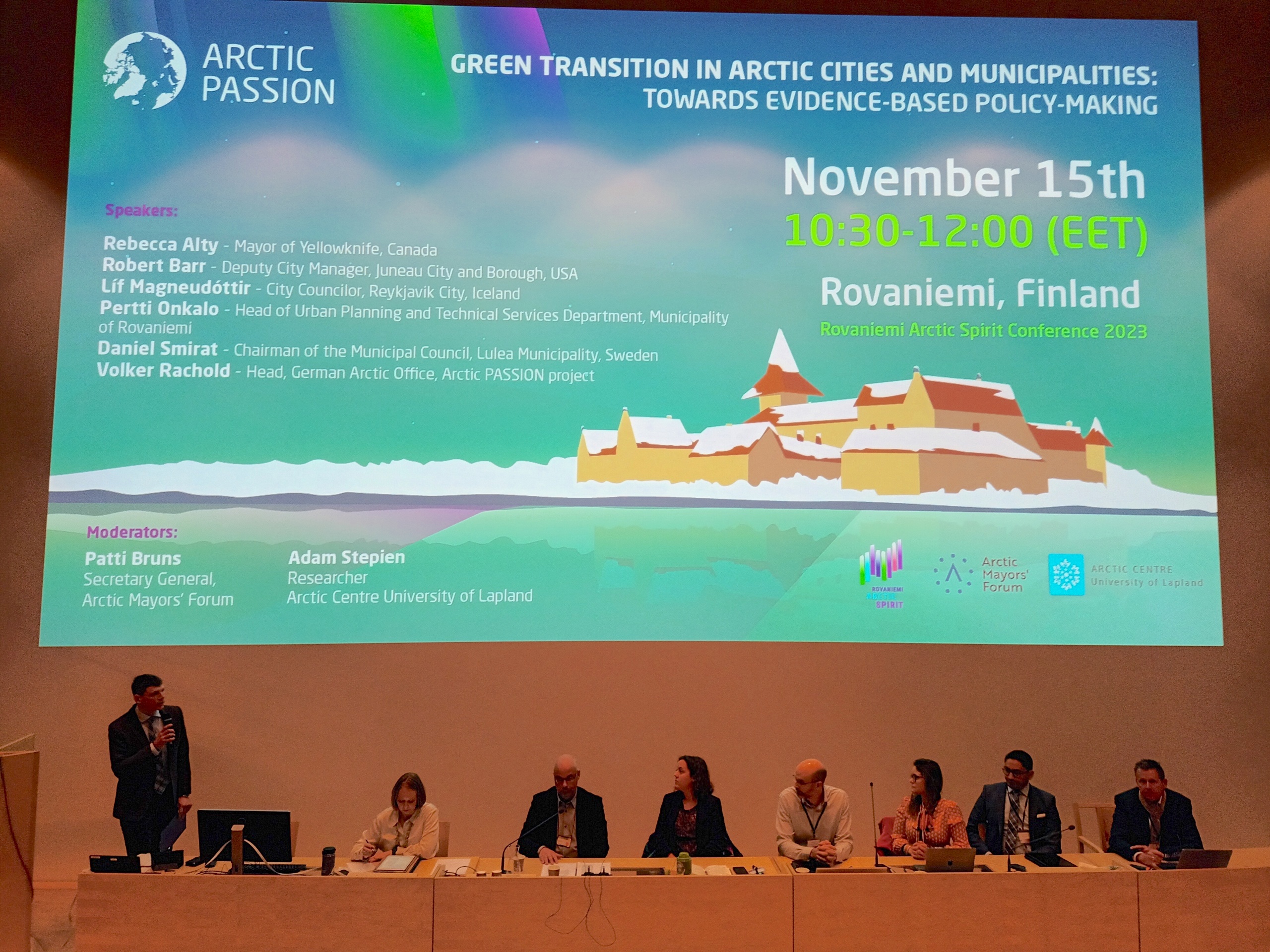Local Arctic Policy-Makers On Good Practices And Challenges For Pursuing Green Transition
by Adam Stepien | Published: 08-Feb-24 | Last updated: 08-Feb-24 | Tags : ArcticCommunities Decision-making GreenTransition | category: NEWS
Adam Stepien from the Arctic Centre of the University of Lapland provides insights from the Arctic Spirit Conference in Rovaniemi, November 2023. Learn more about the success stories and challenges faced by Arctic communities in the times of the green transition.
In November 2023, in cooperation with the Arctic Mayors’ Forum, the Arctic PASSION team at the University of Lapland organized a session at the Arctic Spirit Conference in Rovaniemi dedicated to planning and policy-making for green transition at the local level in the Arctic. As a follow-up to this session, we also organized a workshop with municipal officials on evidence-based decision-making.

The participants of the panel discussion (from the right): Volker Rachold, Head of the German Arctic Office, Arctic PASSION project; Daniel Smirat, Chair of the Municipal Council, Lulea Municipality, Sweden; Líf Magneudóttir, City Councilor, Reykjavik City, Iceland; Robert Barr, Deputy City Manager, Juneau City and Borough, USA; Rebecca Alty, Mayor of Yellowknife, Canada; Pertti Onkalo, Head of Urban Planning and Technical Services Department, Municipality of Rovaniemi; the session was moderated by Patti Bruns, Secretary General of the Arctic Mayors’ Forum and Adam Stepien, Arctic Centre of the University of Lapland and Arctic PASSION project. Photo by Pavel Tkach.
During the event, we discussed challenges and benefits of cooperating with private sector in green transition actions, as well as engaging the youth and Indigenous peoples in climate mitigation and adaptation.
Arctic local decision-makers shared success stories and challenges from their municipalities. Representative of Juneau in Alaska said that community engagement is at the core of green transition initiatives. Official from Swedish Lulea highlighted that local governments cannot wait for national decision-makers and need to act on their own. A councillor from Reykjavik stressed that in order for the green transition action to be long-term, just and effective, there is a need to plan better, consider gender dimension, and work together with neighbouring municipalities to avoid transformations to stop at the municipal border. An official from Rovaniemi discussed how at the local level smaller, even micro interventions can together lead to larger success and tangible impact. The Mayor of Yellowknife showcased actions in the field waste management, which is a major challenge for Arctic municipalities and is a major contribution to green transition and emissions reduction that may be less visible for the citizens and people evaluating local actions.
While there are many great initiatives and developments, the participants raised a number of challenges:
First, changing national policies can hinder long-term green transition planning at the local level. Actions that are planned based on national subventions or tax policies can become economically unsustainable if national policies change with the arrival of a new government, as can be the case for instance with appearing and disappearing fossil-fuel-free transport incentives.
Second, universities and research institutes located in Arctic towns can play an important role in supporting local policy-making. However, while in some towns this cooperation is smooth, even formalized, in others it is almost non-existent. Arctic academic community and local decision-makers should try to address this gap and develop long-term relationships.
Third, the challenge for evidence-based policy-making is often not the availability of data, but the public trust in the data. We need to put more efforts into trust-building among Arctic communities in the reliability and relevance of scientific information. This is a task not only for scientists.
Fourth, some northern municipalities lack appropriate benchmarks for measuring their progress and success with respect to pursuing green transition. National or international comparisons, for example with large cities in central Europe, are often inappropriate. This is something that could be tackled through cooperation of Arctic towns and regions, as they share various characteristics and challenges, and their actions can constitute a better reference for their colleagues across the circumpolar North.
There are currently many opportunities for addressing these challenges both jointly and in each Arctic town, including the work carried out within the Arctic PASSION or through the recently launched Arctic Urban and Regional Cooperation network, supported by EU funding.
